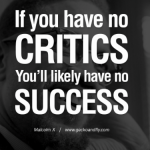Before you react to a disappointing review, consider who sent it – “the peanut gallery” or your peers? ALLi's Creative Advisor Mark McGuinness offers valuable advice on how self-published authors can remain resilient in the face of adverse criticism.
Leonard Cohen is not your typical rock star. Not only does he write slow, melancholic, poetic songs, with a minimalist acoustic accompaniment, he has also spent several years living the reclusive life of a Zen monk, a disciple of the teacher Kyozan Joshu Sasaki Roshi.
In an interview, Cohen told the story of being visited by Roshi at the recording studio during the seventies. The music press critics were writing him off as ‘an old depressive drone peddling suicide notes.’ When the singer asked his teacher what he thought of the music, Roshi replied: “Leonard, you should sing more sad.”
While the critics wanted him to tone it down and deliver something more upbeat, Roshi evidently felt Cohen needed to go in the opposite direction—to stop holding back, forget about people’s expectations, and fully surrender himself to the sadness.
If Cohen had listened to the critics he would have compromised his art and disappointed his fans. No, his work isn’t to everyone’s taste, but trying to please everyone is a recipe for disaster for an artist. Or for anyone else who wants to do something truly original. No wonder Cohen said this was the best advice he ever received.
Consider the Critic
 You’re better off doing nothing than doing something bland. Sometimes it’s important—even fun! —to annoy certain people, and have them hate your work. A nice side effect of this kind of criticism is that your fans will love you all the more, and rush to your defense when they see you being attacked.
You’re better off doing nothing than doing something bland. Sometimes it’s important—even fun! —to annoy certain people, and have them hate your work. A nice side effect of this kind of criticism is that your fans will love you all the more, and rush to your defense when they see you being attacked.
When you’re faced with criticism, it’s easy to take it at face value. But as Leonard Cohen’s story shows us, who is talking is at least as important as what they are saying.
You might not take kindly to an armchair tennis player giving you advice about your backhand, but if the same words came out of the mouth of a grand slam champion, you’d be all ears, however brutal their assessment.
So before deciding what to do about a piece of criticism, always consider where it’s coming from. Here are some of the usual sources:
- Haters and trolls These people get a kick out of making nasty, offensive, and abusive comments. Many of them don’t have the guts to criticize you to your face, so they are particularly common on the internet, where they are known as trolls. They are a tiny minority, but a vocal one. It’s generally best to ignore them. I’ve occasionally received an embarrassed apology when I’ve replied to an abusive comment or email, but most of them aren’t interested in dialogue. If it helps, look on it as a positive sign that you’re attracting enough attention for the haters to notice you and get annoyed. Trying to avoid upsetting anyone is a recipe for mediocrity.
- The peanut gallery This is the term my friend Sonia Simone uses for all the people who have an opinion on your work, but who are irrelevant to your goals. They include the nit-pickers and ‘yes-butters’ who will always find a flaw in your argument, and the well-intentioned nice people who keep asking you to do something different, even though you’re not remotely interested in doing it.You can safely ignore these people too. Be polite, and make a brief reply if you want to, but don’t take them too seriously. And don’t get sidetracked into playing their game.
- The public I’m not a fan of Henry James’s novels, but even I had to feel sorry for him when I heard that story about him being booed off stage by the public at the premiere of one of his plays. There’s no humiliation like a public humiliation. How seriously you take the public’s opinion will depend on what business you’re in. If you’re the editor of a national newspaper, or commissioning a piece of public art, you will probably pay more attention to it than if you’re an avant-garde novelist, or a creator of fine art that only the richest of the rich can afford. If you’re in a punk band, it would be downright embarrassing to discover everybody and their grandmother tapping their feet and singing along to your songs. As an independent author, you may well be less concerned with broadsheet reviewers and literary critics, than the people who buy your books. So forget ‘the public’ and decide who your public is. Once you know who they are, then you can start worrying about what they think of you.
- The professional critics These are the people whose job it is to critique the work and careers of performers in their field. Traditionally they have been newspaper reviewers, literary critics, academics, and TV or radio pundits. These days they are just as likely to be bloggers and social media power users.There are basically two kinds of professional critic: the ones who ‘get’ what you’re trying to do; and the ones who don’t. Pay more attention to the former than the latter. And the sharper your own critical thinking skills, the more confident you will be in assessing the judgment of professional critics. But don’t be too quick to criticize the critics. Sometimes they tell us just what we need to hear, even if we don’t want to hear it.
- Your peers The obvious thing to watch out for here is rivalry. Are they delivering constructive criticism, or trying to take you down a peg or two? Often it’s a bit of both. And maybe that’s no bad thing—creative tensions have been at the heart of many artistic partnerships and friendships (Wordsworth and Coleridge, Kahlo and Rivera, Lennon and McCartney). And remember, there is one thing your peers can offer you that no one else can—the perspective of someone in a situation very similar to yours.
- Your mentor(s) A mentor is an experienced pro who shares what he or she has learned. Roshi, Yoda, and Mr Miyagi are classic mentors. If you’re lucky enough to have a mentor who knows you well enough to make an informed judgment about your work, and who cares enough to tell you where you need to improve, then you owe it to them—and to yourself—to listen. Tennis player Andy Murray had been teetering on the brink of major tournament success for years, but it was not until he hired veteran champion Ivan Lendl as his coach that he won the Olympic Gold Medal and US Open in quick succession. Murray had the talent and stamina to get within touching distance of a major trophy—but he credited his mentor with helping him reach out and seize it. Mentors are not infallible, and sometimes you reach the point where you’ve outgrown them. But it often pays to give them the benefit of the doubt, and consider their criticisms carefully instead of dismissing them. (Just ask Darth Vader.)
Your Next Steps
Next time you encounter criticism, ask yourself who is speaking:
• Haters and trolls—ignore them. Or report them (to their ISP or the police) if the abuse is seriously threatening.
• The peanut gallery—ignore them. Or be polite but don’t take them seriously.
• The public—firstly, separate the general public from your public (your fans and/or potential customers). Ignore the former; listen to the latter, even if you don’t always do what they want.
• Professional critics—firstly, separate the ones who ‘get’ what you are trying to do from the ones who don’t. Feel free to ignore the latter. Analyze the former’s words carefully, to see whether there’s anything you can learn from them.
• Your peers—firstly, try to distinguish between rivalry and genuine criticism. Secondly, ask yourself whether they have a point, and what you can learn from them.
• Your mentor(s) —listen carefully to what they say and consider it over time. If it’s not clear, ask them to explain further. When in doubt, give them the benefit of the doubt.
- This post is an edited version of a single chapter in Mark McGuinness's excellent book






[…] How Indie Authors Can Remain Resilient: Know Which Critics To Listen To and Which To Ignore […]
[…] How Indie Authors Can Remain Resilient: Know Which Critics To Listen To and Which To Ignore […]
In my situation, my own writing is lightly experimental anyway. I refuse to be bound by specific genre conventions. I mean sometimes you just need a good starship and a MC guillotining to get your point across.
So I fully expect critics.
I’d separate out from ‘the public’ two groups: YOUR readers (whom you should at least listen to) and everyone else.
Some people who don’t read you MAY be able to learn to like your writing, but it should be up to you if you want to change yourself enough to court them.
The people who already like you, those are the people you’re trying to recruit into your 1000 True Fans. Some of them may be willing to take the time and articulate what they like/dislike about your writing – but they’re already in your corner.
Alicia
Mark,
Thank you so much for breaking it down this way. You add a balanced view to something fraught with emotion for us sensitive writers. Every book is, after all, our beloved child.
Two bad reviews I’ve had lately–a reader on Amazon and a professional publication.
Which one is more important to me? The Amazon review. The reader was incensed that I had left a cliff-hanger at the end of book 1 of a new self-pub series. In retrospect this was arrogant of me, and I won’t do it again. My readers have come to expect happy endings, even in a series.
The professional publication is one that I’m guessing my readers do not peruse. So, that’s a blow quickly recovered from. Was the review right? Time, and my readers will tell me.
best,
Cathryn
My honest take would be that if you’re clear from the get-go that this is book one in a series (or any book in a series other than the finale), a cliff-hanger ending is far from unreasonable.
One of the best pieces of advice I ever got about dealing with the nasty stuff people post online was that you should never forget that you could be dealing with a 10 year old –
-literally.
Kinda helps put it all in perspective.
Good advice. I don’t think any author is truly a success until some negative reviews come rolling in. You can’t please everyone no matter how wonderful your book is, and so the better it does the more “haters” or people who just didn’t like it will appear with the one-star reviews and their reasons. So instead of being angry, we should celebrate having attracted them (assuming our books aren’t being hated by the average reader of course).
Very wise.